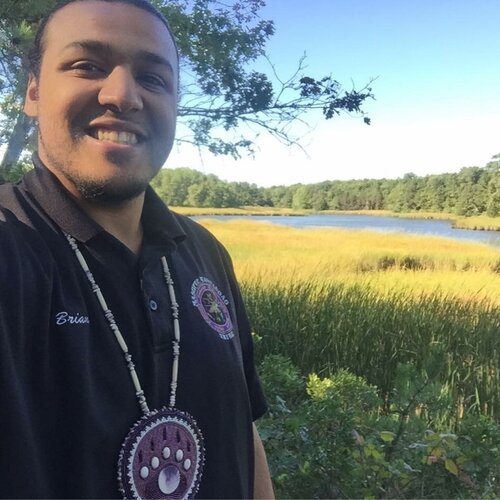Mashpee Wampanoag Tribal Chairman Brian Weeden pleaded not guilty to two charges of theft in Plymouth District Court on Thursday.

Weeden, 30, is facing two charges for allegedly breaking and entering a local museum and stealing four Wampanoag cultural items in November. The cultural items, valued at $10,000, have since been returned to the Plimoth Patuxet Museums, where Weeden once worked.
Want more Native News? Get the free daily newsletter today.
Another suspect in the theft, Phillip C. Hicks, Jr. also pleaded not guilty to the charges of breaking and entering and larceny of less than $1,200.
A pre-trial hearing for both Weeden and Hicks, who is also Mashpee Wampanoag, was set for March 17.
The two were identified as suspects in December after an investigation by Plymouth police. A police report, dated November 9, 2022, said the items were stolen from the “Native American exhibit” at the Plimoth Patuxet Museums at approximately 2 a.m. on Monday, November 7.
The stolen items included two bulrush mats and two black bear skin rugs, taken from inside a “wetu” – a traditional oval shaped hut used historically by the Wampanoag.
Museum staff noticed the items were missing the morning after the incident, but “they were unsure if the items had been removed by another staff member for a repair.” Once staff confirmed that no employee had taken the items, museum staff called the police and reviewed surveillance footage.
 Make A Monthly Donation Here
Make A Monthly Donation Here
The museum’s surveillance footage captured a dark SUV pulling into the museum parking lot, and three people exiting the car—two men and a woman. A fourth man remained in the car for the 18 minutes it took to secure the four stolen items, according to a police report.
A Patuxet Museum staff member, a police officer, and a special detective all identified Weeden as the driver of the vehicle. Police matched Weeden’s license plate registration with photos of his vehicle going north over a nearby bridge leading to the museum at 1:47 a.m., and then going south over that same bridge around 3:30 a.m.
A museum staff member also told police that Weeden, one of the youngest elected tribal chairman in Indian Country, used to work for the museum.
Native News Online reached out to Weeden for comment, but has not heard back from him as this story went live.
More Stories Like This
Native News Weekly (August 25, 2024): D.C. BriefsUS Presidents in Their Own Words Concerning American Indians
Indigenous Actor Elaine Miles Reports Detention by Alleged ICE Agents
Happy Thanksgiving from Native News Online
Coming Up on Native Bidaské: Behind the Animation: Joey Clift Talks “Pow” and Native Storytelling
Help us tell the stories that could save Native languages and food traditions
At a critical moment for Indian Country, Native News Online is embarking on our most ambitious reporting project yet: "Cultivating Culture," a three-year investigation into two forces shaping Native community survival—food sovereignty and language revitalization.
The devastating impact of COVID-19 accelerated the loss of Native elders and with them, irreplaceable cultural knowledge. Yet across tribal communities, innovative leaders are fighting back, reclaiming traditional food systems and breathing new life into Native languages. These aren't just cultural preservation efforts—they're powerful pathways to community health, healing, and resilience.
Our dedicated reporting team will spend three years documenting these stories through on-the-ground reporting in 18 tribal communities, producing over 200 in-depth stories, 18 podcast episodes, and multimedia content that amplifies Indigenous voices. We'll show policymakers, funders, and allies how cultural restoration directly impacts physical and mental wellness while celebrating successful models of sovereignty and self-determination.
This isn't corporate media parachuting into Indian Country for a quick story. This is sustained, relationship-based journalism by Native reporters who understand these communities. It's "Warrior Journalism"—fearless reporting that serves the 5.5 million readers who depend on us for news that mainstream media often ignores.
We need your help right now. While we've secured partial funding, we're still $450,000 short of our three-year budget. Our immediate goal is $25,000 this month to keep this critical work moving forward—funding reporter salaries, travel to remote communities, photography, and the deep reporting these stories deserve.
Every dollar directly supports Indigenous journalists telling Indigenous stories. Whether it's $5 or $50, your contribution ensures these vital narratives of resilience, innovation, and hope don't disappear into silence.
 The stakes couldn't be higher. Native languages are being lost at an alarming rate. Food insecurity plagues many tribal communities. But solutions are emerging, and these stories need to be told.
The stakes couldn't be higher. Native languages are being lost at an alarming rate. Food insecurity plagues many tribal communities. But solutions are emerging, and these stories need to be told.
Support independent Native journalism. Fund the stories that matter.
Levi Rickert (Potawatomi), Editor & Publisher

